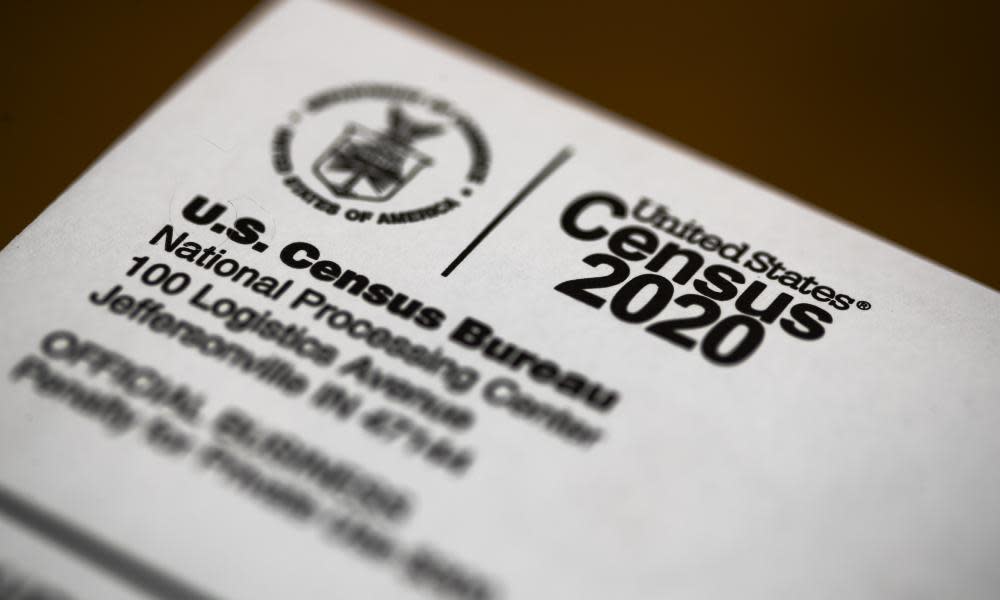Plan to shorten census deadline sounds alarm for disadvantaged Americans

The Census Bureau will end its efforts to count every living person in the US a month earlier than expected, a move that will probably lead to an undercount of communities of color, poorer Americans and other hard-to-count groups.
Related: Coronavirus US: Biden tells Trump 'step up and do your job' over Covid-19 death toll – live
Such an undercount would be catastrophic for those communities. The numbers from the census, which happens every 10 years, are used to determine how nearly $1.5tn in federal funds get allocated and how electoral districts are drawn for the next decade.
The bureau will shorten the deadline to respond to the census by a month and will end counting on 30 September, it announced on Monday. In April, the agency said it needed until 31 October to finish the count and asked Congress to give it a four-month extension of the 31 December deadline to produce data because of the Covid-19 pandemic.
Monday’s announcement came after the bureau quietly removed references to the 31 October deadline from its website and offered no explanation for the reversal and the decision to cut back on the timeline.
The abrupt reversal comes as Trump has shown renewed interest in using the census for partisan gain, and the decision to drop the additional follow-up appears to be an effort to produce data that disadvantages minority groups to use for the next decade.
After unsuccessfully trying to add a citizenship question to the census, Trump ordered the Census Bureau last month not to count undocumented immigrants in the tally it uses to determine how districts are drawn. The order, already being challenged in court, is probably unconstitutional. The US constitution specifically requires the census to count all “persons”.
The shortened deadline will also curtail a critical census operation called non-response follow-up (NRFU), when bureau employees knock on doors to follow up with people who have not responded to the census. Experts and census advocates are deeply worried about curtailing the operation, noting that NRFU is one of the most important ways the bureau ensures traditionally hard-to-count groups get included in the census.
“If you reduce your efforts, the most likely populations you’re not going to count are the hard-to-count,” said John Thompson, the director of the Census Bureau from 2013 to 2017.
It’s unclear whether the Census Bureau will be able to produce reliable data to be used to determine how many seats in Congress each state gets. Under the original requested delay, there was a six-month gap between the end of counting and when the bureau would be required to produce the data. That period is used to review and verify data, but under the new plan, officials will have just three months.
“Cutting NRFU a month short is bad enough, but even ending on 9/30, there just will not be enough time to process the data in a way that’s up to our standards before 12/31,” said one Census Bureau employee who spoke on condition of anonymity because they were not authorized to speak publicly.
“The best we can do at this point is document all the myriad of limitations that will be imposed as a result of not extending the delivery deadline.”
Americans were able to begin self-responding to the census in March, and 62.9% of US households had done so as of Tuesday afternoon. But many localities in the country are further behind in their response rate than they were at the same point during the 2010 census. Many places also have rates that are far lower than the national rate. In Detroit, for example, less than half of households have self-responded to the census.
“If you go into cities and look at the track-level analysis … you’ll see some really low response rates,” Thompson said. “Those are going to be the ones that are going to be the hardest to enumerate because you’re going to have to do a lot more work, get a lot more people in there.”
The bureau is facing unprecedented challenges already, and now it’s just putting one more in front of them
John Thompson
Thompson added that the bureau may have to rely more on statistical imputation to model information for households that don’t respond. In the past, the process has been used for just a small percentage of households for whom the bureau can’t get information after extensive follow-up. That kind of imputation could also lead to underrepresentation of hard-to-count groups, Thompson said.
“The Census Bureau is facing unprecedented challenges already, and now it’s just putting one more challenge in front of them,” Thompson said. “The end result could be some pretty serious undercounts.”
Federal law requires the Census Bureau to report data for apportionment by 31 December, but the Trump administration’s request for an extension came after Covid-19 upended the census and made it virtually impossible for the bureau to collect data. Even Donald Trump said publicly in April that the bureau needed a delay in producing data.
Top bureau officials said earlier this year that the agency had “passed the point” of being able to deliver data by the end of the year, NPR reported.

 Yahoo News
Yahoo News 
